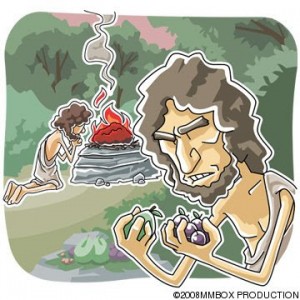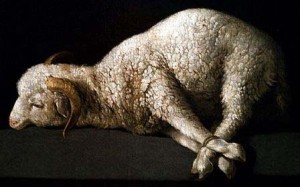 Though some believe the first sacrifice in the Bible is found in Genesis 3:21, others say the first sacrifice in Scripture is one chapter later in Genesis 4 when Cain brings an offering of fruit and Abel brings the firstborn from his flock.
Though some believe the first sacrifice in the Bible is found in Genesis 3:21, others say the first sacrifice in Scripture is one chapter later in Genesis 4 when Cain brings an offering of fruit and Abel brings the firstborn from his flock.
But just as people who view Genesis 3:21 as the first sacrifice read a lot of their theology into that verse, we also tend to read a lot of sacrificial and atonement theology into Genesis 4 which is not there. In so doing, we often miss what actually seems to be present in the text itself.
Why Did Cain Make an Offering to God?
Note first of all that nowhere in the text does God command or instruct people to bring sacrifices and offerings to Him. This practice seems to be Cain’s idea.
Why would Cain do this?
Cain, we must remember, was raised with his parents telling him the story about how they disobeyed God and were barred from the Garden of Eden.
Cain knew that the reason his parents were disciplined by God was that they had eaten forbidden fruit. He also knew that when God had explained to Adam and Eve the consequences of their sin, God had told them that the Seed of the woman would set things right (Genesis 3:15). When Eve bore her firstborn son, she named Cain, and said, “I have acquired a man from the Lord” (Genesis 4:1).
From this it appears that Adam and Eve thought that Cain would be the one who would set things right and allow them to return to the Garden of Eden.
This is the story that Cain grew up with. This is the narrative that guided Cain’s life.
So it is not surprising that as he grew older, Cain looked for ways to get his family back into the Garden. Genesis 4 says that he became a tiller of the ground (Genesis 4:2), and he brought an offering of fruit to the Lord (Genesis 4:3).
Why fruit? Not because God had asked for it. God hadn’t asked for anything. Cain brought fruit because this is what his parents had taken from God.
In effect, Cain was trying to give God back His fruit.
Cain was trying to please and appease God, and hopefully, gain a way for himself and his family to reenter the Garden of Eden. He was trying to fulfill the expectations of his parents.
What about the Offering of Abel?

The text goes on to say that Abel brought an offering also, but since he was a keeper of sheep, he brought “the firstborn of his flock and of their fat” (Genesis 4:4).
We must be careful to not read sacrifice into this. The text does not say that Abel killed the firstborn of his flock. The text calls it an “offering,” which does not necessarily imply a blood sacrifice.
People get the idea of sacrifice from the text because it says that Abel also offered the fat of his flock. How could he have done this if the animal had not been killed?
Some early Jewish and Christian scholars noted that the consonants of the Hebrew word for “fat” are the same as the Hebrew word for milk and curds (Heb., ch-l-v), and so they understood this text to be saying that Abel offered milk products up to the Lord. The Jewish historian Josephus is one such source, who wrote that “Cain brought the fruits of the earth, and of his husbandry; but Abel brought milk and the first-fruits of his flocks” (Antiquities 1.2.1).
Some have also noted that the Hebrew word translated “and” could also be translated as “that is.” When this is taken into consideration as well, Genesis 4:4 could be translated this way: “Abel also brought the firstborn of his flock, that is, of their milk.”
Though some might consider such an interpretation to be far-fetched, we must ask ourselves why the text would refer to the “fat” of the flock if what God really wanted was blood. If it truly is blood sacrifice that God desires, and this is why God accepted Abel’s sacrifice over Cain’s, then wouldn’t the text have been clearer if it has emphasized the blood of the flock instead of the fat?
Furthermore, since everybody at this time were vegetarians (cf. Genesis 9:1-4), it would make no sense for Abel to think of offering a dead animal to God. What reason could there be for God to want a dead animal?
Nevertheless, no matter how we understand the offering of Abel, the real question from Genesis 4 is why God accepted Abel’s offering but rejected Cain’s. We will look at this question tomorrow.
What do you think? Do you think Abel killed an animal and gave it to God? Other than tradition, why do you think so?




 Many people believe that Hebrews 10:26 teaches that people lose their salvation for willful sin. This passage has perplexed Christians for centuries.
Many people believe that Hebrews 10:26 teaches that people lose their salvation for willful sin. This passage has perplexed Christians for centuries. When the author of Hebrews writes his letter, he is writing to people who want to reject the sacrifice of Jesus on the cross as sufficient for our sins, and return to dependence and reliance upon the Levitical Law. In numerous warning passages (Heb 2:1-4; 3:7-19;
When the author of Hebrews writes his letter, he is writing to people who want to reject the sacrifice of Jesus on the cross as sufficient for our sins, and return to dependence and reliance upon the Levitical Law. In numerous warning passages (Heb 2:1-4; 3:7-19; 